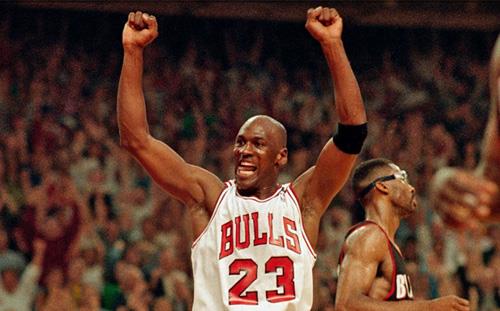
Sports fans are finding no shortage of classic sports programming on their TV sets these days. In fact, that’s about all they’re finding, and it’s getting, so to speak, a little old.
The Last Dance, a 10-part miniseries chronicling the 1997-98 season of the Chicago Bulls, raises the bar. It premiered Sunday at 9 p.m. ET on ESPN with back-to-back opening episodes and is a splendidly filmed and edited documentary well supported with frank retrospective commentary from everyone involved.
The 1997-98 Bulls season was more than just the grand finale to the Michael Jordan era, finishing with the sixth NBA title to which Jordan had led the Bulls in eight seasons.
It also became a strange and remarkable showdown between the team and its management, with Jordan, the other players, and coach Phil Jackson convinced that owner Eddie Reinsdorf and general manager Jerry Krauss didn’t have faith they could really win that sixth title.
We hear all the time about how athletes use doubt as motivation. Don’t you believe we can win? Watch us.
This season, as portrayed in Last Dance, plays like a Hollywood script written to prove that.
Heck, just turning a dynasty that had won five titles in seven seasons into disrespected underdogs is fascinating to watch.
And so, on the most basic sports-fan level, is watching this Bulls team – starting with Jordan, an insanely skilled basketball player who is undoubtedly among the greatest ever.
Last Dance, incidentally, doesn’t make that assertion into a conversation. It anoints and crowns Jordan from the opening moments, with no apologies to LeBron, Kobe, Magic, Kareem, Oscar, or Bill.
Nor is Jordan the only player here who is a sheer pleasure to watch. Pippen was a wizard at complementing Michael and a brilliant player on his own. Rodman may have been mainly comprised of quirks, but no one better understood the art of rebounding. And the peripheral players were pretty good, too, just always in the shadows.
Jackson, the one who called that season “the last dance” after he was given a final one-year contract, has built his own reputation over the years as a sort of mystical figure. He comes off here less as the Zen master than a practical coach maximizing the lavish resources with which he has been gifted.
Jordan, by the 1997-98 season, was already well aware of his stature in the game, and while part of him is still one of the guys in the locker room, he’s also acutely aware of how valuable a brand he has become and what that brand could mean going forward. That may be why the most interesting Jordan moments are the passing glimpses of the person underneath.
Director Jason Hehir gives The Last Dance a fast pace, using quick-action game footage in between the extensive and often revealing interviews. If he has an agenda, it’s reverence for the players and open admiration for how they respond to the exhausting task of fending off every challenge, real and created.
Because Last Dance films professional athletes in otherwise off-camera moments, the language gets strong, which has led ESPN to the unusual gambit of showing two versions simultaneously.
The uncut, more profane version will air on ESPN, while a cleaned-up version will air on ESPN2. On both platforms, we will get two episodes of the show every Sunday night for five weeks. Netflix, which is also a producer of the show, will initially air it only outside the United States.
Last Dance is quality stuff, not just as a sports documentary, but as a documentary in general. Fans might want to keep just two caveats in mind:
One, the fact that all this happened 22 seasons ago makes it a little more historical and a little less visceral. If you’re under 30, you don’t remember much -- if any of it.
Two, those who are already Bulls or Michael Jordan fans will likely find Last Dance at least ten times more riveting, provocative, and ultimately exhilarating than those who are not.
That’s not a knock on the show. It’s just how being a sports fan works.